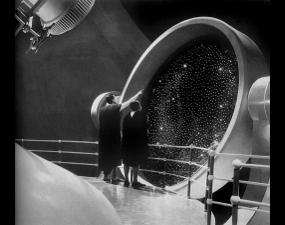Dragons; fighting flora; the memories we leave behind; a clash of beliefs; the human condition; heritage thieves, and despicable scoundrels, are just some of the delights on offer in. . .
This latest issue of The Magazine of Fantasy & Science Fiction has a total of 15 short stories, novelettes and novellas, and no less than 10 poems. Together with an awesome cover, The Many Different Kinds of Love, by Alan M. Clark, they’ll definitely work their magic to get you in the holiday mood.
So, let’s start building that mood, and begin, as always, with our poetry submissions.
Through the keyhole, by Lisa M. Bradley explores the full gamut of what that phrase actually means: A willingness to open oneself to spiritual growth and transformation; the possibility of gaining hidden knowledge; to access the extremely private or intimate.
All this, and more, in a supernatural setting that will leave you howling for a closer look. (And a great item to start the review with).
No One Now Remembers, and Titan, by Geoffrey A. Landis are poems as immersive as they are poignant, especially as they deliver juxtaposition of the never-ending cycle of universal life. The first gives homage to those long-dead creatures whose journey ended 65 million years ago in cataclysmic change; the second pays tribute to the new and exciting life now stirring beneath the methane and ethane seas of Titan.
I really enjoyed this comparison, and I’m sure you will too.
Like Other Girls, by Marissa Lingen explores the consequence of choices. When everything we’ve ever loved is taken away from us, do we adapt to change, or long for what we’ve left behind?
I like poems that leave you guessing as to the outcome, and this one will certainly do that.
Orchid Dragon, and Phoenix Dragon, two poems by Mary Soon Lee offer another contrast, this time from the point of view of those most mystical creatures. Dragons.
And it’s subtly done, for how often we underestimate what we do not understand. Well, might not that also be true of the dragons themselves? See then, how Mary Soon Lee highlights that supposition in these beautifully crafted poems, as seen through the eyes of two different protagonists. Yes, experience and naivety, and knowledge and the thrill of discovery combine to pull you in, so that you get to experience the true wonder of what is to know dragons.
The poem, Science Fiction Novel in Four to Seven Words, by Chet Weise is an excellent example of how to deliver what you want to say in a few words. I really appreciate prose like this. Both pithy and punchy. And I’m sure you will too.
The Music of Neptune and Lesser Realities are another pair of poems, this time from Brian U. Garrison. And I love what he did with them. The Music of Neptune sets the tone, so to speak, by reminding us of the orchestra awaiting us, if we only knew how to listen to the songs each planet sings in their lonely sojourn through space and around the Sun.
Well, distant they may be, but each has a story to tell in the same ensemble.
And in Lesser Realities, we are reminded of the subatomic and the quantum realities that actually listen to that story and dance to its music. All unseen. All unheard.
(That doesn’t mean they aren’t enjoying themselves though).
The Cancelled Sky, by Roger Dutcher is an epic, apocalyptic extravaganza, told in a few words. I really enjoyed his use of rich imagery and attention to detail as he describes the world’s end, and the human race’s ascension toward a journey that will take them across the vacuum to a new ‘home.’ This poem speaks to you, on many levels, if you have the ears to listen.
Awesome stuff!
Triple Knot, by Marisca Pichette is a clever tribute to the eternal circle of life, and those ancient rites that will ensure that more – much more – than treasured memories live on. I can’t express how much I enjoyed this one. Why not immerse yourselves in the magic. Focus on it. Channel it, and see where your imagination takes you.
A superb poem, and just the right thing to end this section of the review on.
And now for the stories:
I’m diving straight in at the deep end with The Many Different Kinds of Love, by Geoff Ryman with David Jeffrey. But hey, what do you expect when you combine the talents of an award winning author and a professional designer of underwater vessels? A superbly crafted Novella, that what! And a profoundly reflective one too, adrift in a sea of star-filled possibilities. (Take a peek at the cover and be inspired).
Yet, for all its length, I find it difficult to explain the story arc without giving away or spoiling the pearls you’ll find within it. So, to put you in the right frame of mind to wade into this offering, consider this: Have you ever wondered what will happen when one of the deep space probes we’ve sent out into the cosmos eventually gets picked up by intelligent life? The point being, such a long time will have passed and soooo many things will have happened in between that there’s every chance we might not be around to say ‘hello’ in person. And, here’s the rub, what if all that remains of the human race is what’s recorded in digital – or whatever – format? Or as portrayed by a learning AI?
Sends a tingle town the spine doesn’t it? But if you do as I suggest, that’s exactly what will happen as you read this most excellent opening story, because it covers a very similar theme. One that will leave you floating in a sea of possibilities.
Amal Singh poses something of a quandary for us in, Karantha Fish, an immersive story about principals and religion.
Imagine, if you will, that someone you love is dying. Someone who has been an incredible source of inspiration, not only in your life, but in the lives of others too. And YOU have the power to save them. However, if you do so, you’ll not only break the law, but trample on their beliefs as well . . . raising the question: Is forcing your will on others – even for a good cause – acceptable?
Well, Amal Singh addresses this provocative dilemma in his story. And what a moving one it is.
Longevity, by Anya Ow, will appeal to all those who have ever called up a company, asking for help or to make a complaint, only to get fobbed off onto an autobot with it predetermined responses. Infuriating, isn’t it? When all you want to do is speak to an actual person.
But, what if society ever reaches a stage where we’ve become so augmented by mods and edits that we stop being human? Will there ever be a time when humans become redundant or lose the most fundamental aspects of their humanity because – for example – they could adapt themselves to any environment, or live far beyond what’s considered a natural lifespan?
Well, Anya Ow considers these aspects of human nature in Longevity. And as you’ll soon discover, immortality isn’t all it’s cracked up to be. I also have to say, though Longevity is set in a future ‘techno-world’ where society is now bound to a regimented form of existence, the power of its message immediately reminded me the Gift of Ilúvatar, in J. R. R. Tolkien’s The Silmarillion, which allowed men to escape the fate of the world and shape their own destiny through the legacy of death. And THAT dear reader, is flawlessly accentuated in this story.
We’ve all heard that expression, “God, I’d kill to. . .”
Drink a cool glass of water on a very hot day; sit in front of a roaring fire after a five-mile trek through waist deep snow, etc etc.
We all have our own particular set of circumstances for uttering those immortal words. I know I have, on a number of occasions, especially when there’s nothing decent to watch on the film channels, or if there’s nothing good to read.
Well, In All That We Leave Behind, by Charlie Hughes, we take a darker look at one particular aspect of that maxim, as delivered via Shipton Literary Club members after reading their latest offering: All That We Leave Behind – author unknown.
And it’s an outstandingly clever twist on the precept of what everybody does when they read a work of fiction. Because, don’t all of us enter into a contract with the author to suspend our beliefs and allow THEM to paint a new reality for us as we delve into the realms of what if?
But, what happens when what if becomes what IS? Ah, that’s a different story. One with consequences. And Charlie Hughes rams those consequences in our faces with an exceptional tale that will chill you to the bone. (I r-e-a-l-l-y enjoyed this one).
Our first novelette, Portrait of a Dragon as a Young Man, by J. A. Pak, has all the familiarity and old-world charm of a grandfather, sitting in his chair, grandchildren at his feet, regaling them with tales of wonder and discovery.
And in many respects, that’s exactly what you get with, Portrait of a Dragon as a Young Man, because we stop by for another visit with someone we’ve met before in a previous issue of The Magazine of Fantasy & Science Fiction: The Dragon Faine, a creature of refinement and antiquity, who stopped by to reminisce on his time, spent among humans – long, long ago – when he was still a young dragon-child of only 40 years old.
It’s quaint. Endearing. Has a comfortable ‘fairytale charm’ to it that will make you smile, and I’m sure that it will make you long for the days when you were a child, listing to tall tales at the knee of a beloved grandparent.
Great stuff.
Twelve Aspects of the Dragon, by Rachael K. Jones not only continues the mythical, fire breathing theme of our last story, but it also provides an essential guide for those of you considering embarking on a quest.
Contemplate her instructions carefully, and remember . . . the line between fact and fiction isn’t always as sharp as you think it is. I thoroughly enjoyed it, as it’s a great example of telling a full story in a brief amount of time.
For those of us who are older, the Cold War brings memories of political and industrial espionage between the U.S. and the Soviet Union, and the western and eastern blocs that supported them. The term ‘cold war’ was coined because, though there were never any direct, large scale encounters between the 2 main contenders, they did fight numerous proxy wars in those territories and regions that supported the ‘opposition.’
Imagine a world, then, where there’s an all too real and ongoing cold war between two of the biggest dominions in existence: the living and the dead.
What a scenario!
How would agents operate? How would intelligence be gathered? On what battlefield would clandestine operations be waged?
Those questions, and more, are considered in the inconspicuously titled, Meeting in Greenwood, by R. K. Duncan. And if you’re anything like me, you’ll love it.
The Pigeon Wife, by Samantha E. Chung reminded me, in some respects, of the Korean fable of the ‘pigeon and the magpie.’ In that tale, the pigeon is tricked by magpie into giving more of itself than it would have preferred. And of course, the pigeon ends up plotting its revenge. . .
Bear that in mind, as Samantha Chung’s story takes a hold of that fable and brings it right up to date on a much grander scale. I really appreciated the moral it contains, as it’s just as relevant today as it’s always been.
Have you ever brought or made the perfect gift for someone you love?
If so, then, Los Pajaritos, by Sam W. Pisciotta, is exactly the story for you. Told in poignant reminiscence, it details the efforts put in by a man, in honor of the memory of the woman he loved and cared for – through life – and as she lay dying. And so faultlessly pure is that gift, that it surprises him by its fleeting existence . . . (You’ll see). I wish I could say more, but I daren’t spoil the impact this profoundly moving story will make. And kudos to Sam W. Pisciotta for weaving a whole lot of memory, love and loyalty into such a short story. I was bowled over!
Brooke Brannon’s offering, Pluto and Tavis D Work the Door, reminded me, in many respects, of the Guatemalan legends of La Siguanaba (who shows herself to unfaithful men in order to steal their stories before taking their lives), and La Liorona, (who wanders the streets in search of her lost children, who she murdered). A spirit that can freeze a person in place with a single word or scream.
You’ll see aspects of these legends in Pluto and Tavis D Work the Door, with a delicious twist. As here, our antagonist has set her sights on the history and heritage of our eponymous heroes. Something threaded into the very weave of the clothes they wear. A clever story, this. And one that I enjoyed immensely.
Have you ever wondered how it is that, no matter where intrepid space explorers go in films and stories, they always seem to expect the planet they land on to adapt and suit their purposes? I’m sure we’ve all seen it in one way or another. A beautiful pristine world, lush with life, terraformed to suit the needs of its new masters.
Well, Jennifer Maloney must have pondered the same thing, and she addresses this dilemma in Indigena, a story that highlights what might happen on such a faraway world if it’s essence possessed sufficient awareness to recognize the danger and. . .?
Ah, that would be giving it away.
But let me just remind you, not everything out there would be as callous and self-destructive as humans. Even so, the floral compromise this world offers might require a change of perspective. One that we’re not really prepared for.
You’ll see, in an outstanding story that reminded me very much of the dandelion seeds I used to enjoy watching, playing on the wind as a child. (Nice one, Jennifer).
I have to be very careful not to give anything away about Christopher Crews’ New Stars, because it’s a superb example of creating ‘the mood’ and getting it right. The story itself is brief, and set in a future world where you get the sense that humans, though living a seemingly tranquil idyll, don’t actually do anything new anymore. There’s an undertone of stagnation. A profound sense of loss. All of it, eating away at the threads of an overly joyous occasion. And that takes some skill . . . which translates into a great story.
High Tide at the Olduvai Gorge, by Kedrick Brown, reminded me of the 1945 George Orwell classic, Animal Farm, and the immortal line uttered by Napoleon: “All animals are equal, but some animals are more equal than others,” revealing that while the pigs claimed to adhere to the principals of equality, in reality, they were only too ready to jealously protect their power and positions within the hierarchical society they’d built.
Bear that in mind when you read High Tide at the Olduvai Gorge, as Kedrick Brown encapsulates that mood perfectly, and presents a cautionary tale of what might one day happen to our splintered human global community if we don’t ‘switch on’ and start putting our differences aside, and start working together now.
An excellent story. And one with a powerful message.
Prisoner 121 is Guilty, by Renee Pillai, is a clever and disturbing account that rings all too true in today’s so-called ‘cultured’ world. We’ve all seen how fragmented society can be, as highlighted by an ever prevalent social and economic pecking order. We’re all supposed to be equal but, as my previous review so aptly highlighted, some are more equal than others. And with that disparity comes an altered perspective, especially when it comes to the value of human life and what’s truly important.
Look for those points in Prisoner 121 is Guilty, as Renee Pillai skillfully, subtly, but oh so powerfully drives that point home, making you wonder . . . How do I view those around me?
Hats off to the author. This one will get you thinking.
Our final story, a novelette, Fools and their Money, by Meighan Hogate, does exactly what it says on the tin. And yes, the phrase “A Fool and his money are soon parted” plays an integral theme to this story – as told by our anti-hero Pheera, a carrion eater and all-round scoundrel with a bluntly pragmatic way of looking at things. I loved him. And I loved the style Hogate uses to portray Pheera’s inner dialogue.
A great story, setting just the right tone to round this latest edition off.
**********
As I look back over this edition, I have to admit how much fun it was to review. The stories rolled off the page in an effortless manner that made them a joy to read. And with something this slick and polished, well, you’ve found yourself the perfect present for that someone special in your life.
It IS the holiday season after all.
So, until the next time, have a most excellent November and December, and I’ll see you all again in the New Year. (Wow! 2024 here we come. . .)










